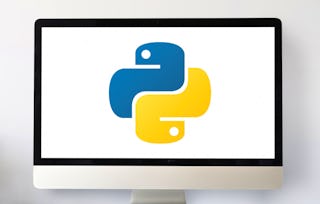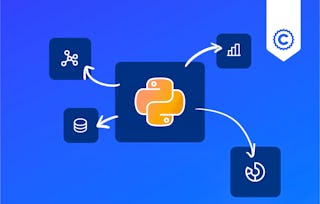Modern programs are complicated structures, with hundreds to thousands of lines of code, but how do you efficiently move from smaller programs to more robust, complicated programs? How do data scientists simulate the randomness of real world problems in their programs? What techniques and best practices can you leverage to design pieces of software that can efficiently handle large amounts of data? In this course from Duke University, Python users will learn about how to create larger, multi-functional programs that can handle more complex tasks.

Designing Larger Python Programs for Data Science

Designing Larger Python Programs for Data Science
This course is part of Programming for Python Data Science: Principles to Practice Specialization



Instructors: Genevieve M. Lipp
Included with
Recommended experience
What you'll learn
How to plan program decomposition using top down design.
How to integrate discrete pieces of Python code into a larger, more functional, and complex program.
Skills you'll gain
Details to know

Add to your LinkedIn profile
1 assignment
See how employees at top companies are mastering in-demand skills

Build your subject-matter expertise
- Learn new concepts from industry experts
- Gain a foundational understanding of a subject or tool
- Develop job-relevant skills with hands-on projects
- Earn a shareable career certificate

There are 4 modules in this course
This module, you’ll learn how to apply the concepts you’ve learned previously to analyze larger programs. Additionally, we’ll go through the process of program decomposition, to break up a complicated program into smaller steps that we can solve easier. After all of those pieces, we’ll put our pieces together in a programming assignment that combines a lot of the smaller programs we’ve created throughout the module.
What's included
6 videos3 readings4 programming assignments
This Module, you’ll learn about Monte Carlo methods, which are a common technique we use to simulate a lot of possible outcomes. We’ll also introduce you to the Poker Project that you’ll be working on for the rest of the course. In this module we’ll focus on how we can write code to simulate different possible outcomes for a hand of poker, and the individual programming problems we’ll need to solve to make a complete poker simulation. You’ll create some of these smaller solutions in this module, and receive feedback on these individual pieces before we move onto synthesizing some of these parts together in the next module.
What's included
1 video2 readings3 programming assignments
This module, you will learn about writing test cases and debugging in a Python program, and apply it to your poker project! Additionally we’ll move forward to the logical evaluation part of the poker project, where you’ll write the code that will allow your program to decide what a winning hand would be, and use some data science techniques to help clean up the data generated by Monte Carlo methods. Similarly to the last unit, you’ll write these individual parts of the program and get feedback on those, before we move on to the next unit, where we’ll synthesize all of these pieces into a complete poker hand simulation.
What's included
1 reading1 assignment3 programming assignments
This module, we’ll integrate all of the individual sections of Python code that we’ve written throughout the course into one larger program. This will likely require a bit of troubleshooting and forethought to get all of your previous bits of code working, but you will leverage the test cases and skills you learned in the previous module to accomplish this. We’ll also go over object references, a way that we can directly reference a piece of memory, to efficiently update the information that the various parts of your program will be using. After all of this, we’ll give feedback on your final poker project, and then we’ll ask you to do a short reflection on your poker project and the experience you had creating a larger program from its discrete components.
What's included
1 video2 readings2 programming assignments1 discussion prompt
Earn a career certificate
Add this credential to your LinkedIn profile, resume, or CV. Share it on social media and in your performance review.
Offered by
Explore more from Software Development
 Status: Free Trial
Status: Free TrialDuke University
 Status: Preview
Status: PreviewUniversity of Leeds
 Status: Free Trial
Status: Free Trial Status: Free Trial
Status: Free Trial
Why people choose Coursera for their career

Felipe M.

Jennifer J.

Larry W.

Chaitanya A.

Open new doors with Coursera Plus
Unlimited access to 10,000+ world-class courses, hands-on projects, and job-ready certificate programs - all included in your subscription
Advance your career with an online degree
Earn a degree from world-class universities - 100% online
Join over 3,400 global companies that choose Coursera for Business
Upskill your employees to excel in the digital economy
Frequently asked questions
To access the course materials, assignments and to earn a Certificate, you will need to purchase the Certificate experience when you enroll in a course. You can try a Free Trial instead, or apply for Financial Aid. The course may offer 'Full Course, No Certificate' instead. This option lets you see all course materials, submit required assessments, and get a final grade. This also means that you will not be able to purchase a Certificate experience.
When you enroll in the course, you get access to all of the courses in the Specialization, and you earn a certificate when you complete the work. Your electronic Certificate will be added to your Accomplishments page - from there, you can print your Certificate or add it to your LinkedIn profile.
Yes. In select learning programs, you can apply for financial aid or a scholarship if you can’t afford the enrollment fee. If fin aid or scholarship is available for your learning program selection, you’ll find a link to apply on the description page.
More questions
Financial aid available,


